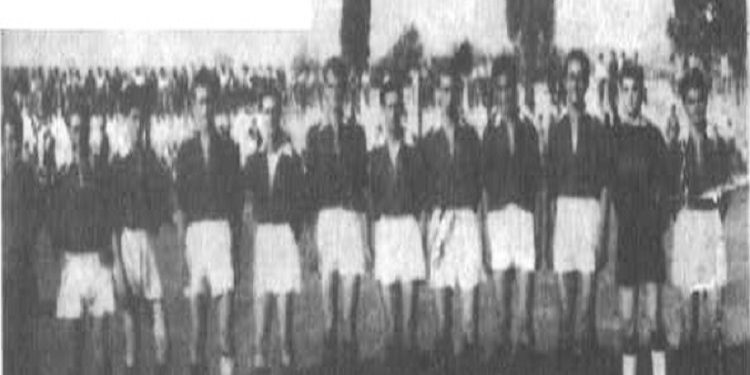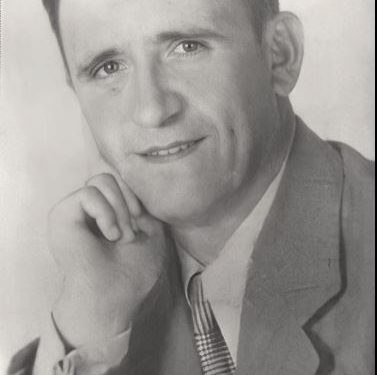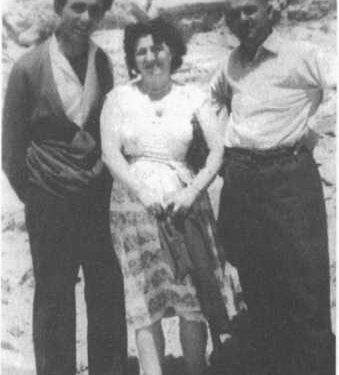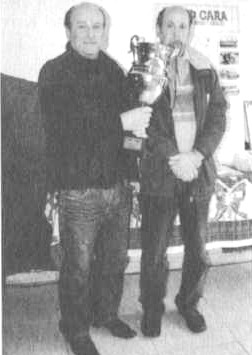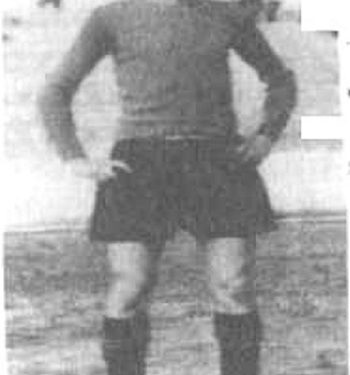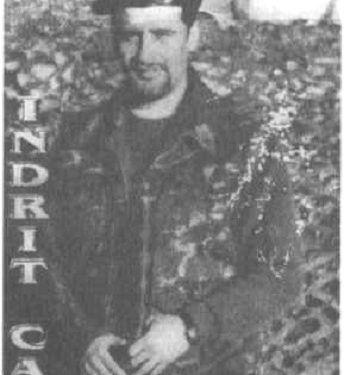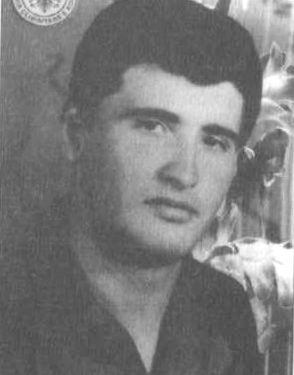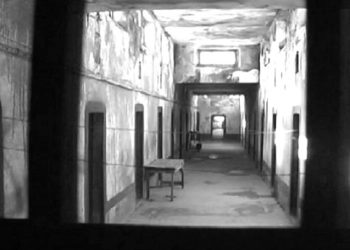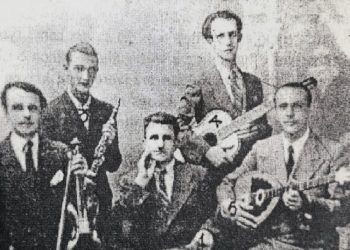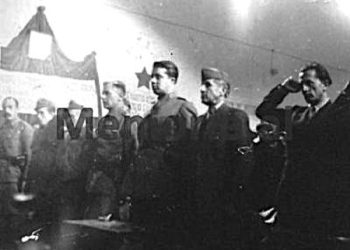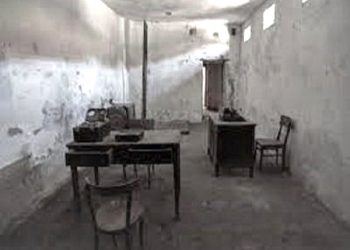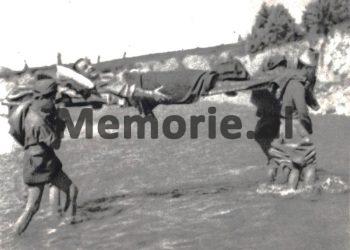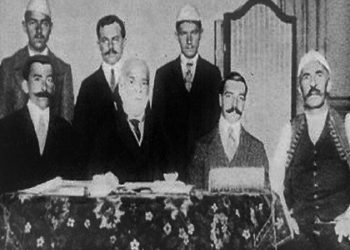From Sofika Prifti Cara
Part Two
To Forgive…!
– The old family clan of Kavaja – CARA
Memorie.al publishes some excerpts from the book ‘To Forgive’ (Të falësh), authored by Ms. Sofika Prifti (Cara), published by the Institute for the Study of Crimes and Consequences of Communism in Tirana, in which the author has described in detail and with professional competence the history of one of the most prominent family clans, not only in the city of Kavaja but also beyond, the Cara clan, from which emerged not only distinguished patriots who contributed to the national cause and the freedom of Albania, but also well-known intellectuals, graduated in the West, who later returned to the homeland, contributing in several fields of science and life. But even though the scions of the Cara clan dedicated their lives to the national cause, after the communists came to power at the end of 1944, they would be persecuted, imprisoned, and interned, and the fierce class struggle would pursue them until 1990, when the collapse of the communist regime began.
Continued from the previous issue
ET’HEM CARA
The German Commander-in-Chief, seeing that this man was very determined and courageous, honest and correct, understood that he was dealing with a man of strong character, left angered, without achieving his goal. In December 1944, when there were no longer foreign armies in Albania and the communists took power, Doctor Et’hem Cara, as could be expected, was arrested by partisan forces in Tirana, at his home, on “Hoxha Tahsim” street. In the Special Court of 1945, he was sentenced as a former Minister of Finance, a position he had held for three months, on the charge of “collaboration with the occupiers,” a charge he never accepted. To the prosecutor’s question: “Why didn’t you leave Albania?” Doctor Et’hem replied with dignity: “I have never felt guilty in my own country! I would rather accept my brother stabbing me than wander the world!” He was sentenced to 18 years in prison by that regime.
His character did not change even in prison; Dr. Et’hem always remained respected and honored by his friends and well-wishers. Even in prison, high communist state authorities sought his help and opinions on how to carry out financial, banking, and monetary transactions, with checks, foreign currencies, and other accounts. After serving 18 years in prison, he was released and was still constantly persecuted by the communist regime, living in misery, having even had his house in Tirana taken from him. Et’hem was then forced to return to his hometown, Kavaja. Doctor Et’hem Cara died on July 31, 1973, in the “Sallbeg” neighborhood in Kavaja, at the age of 68, from a sudden illness. This big-hearted man will remain unforgettable in the memory of the entire people of Kavaja, for his work, which was as humane as it was noble, having saved the lives of 350 men.
His funeral was magnificent; the people present there were not only from Kavaja but from all over Albania. They had come to bid farewell to a very intelligent and humane person. Only the eulogy was missing. It is understood why Et’hem was not spoken about there; he had been a minister in an anti-communist government! However, this type of funeral deeply shook the regime of the time, because even members of this party, i.e., communists, were present there. But besides meetings and warnings, there were also threats and expulsions from the party! Immediately the newspapers began to “cluck”; “Zëri i Popullit” (Voice of the People) and “Adriatiku” (The Adriatic), published in Durrës, with attacks and criticisms, for “weakness and softening of the class struggle in Kavaja,” etc.
The change in the helm of Albanian politics after 1991 restored justice for the injustices that had been committed during the communist regime in Albania. At the proposal of the “Bajram Xhani” association and with the approval of the city council, Dr. Et’hem Cara was honored with the title “HONORARY CITIZEN” of Kavaja (posthumously). The then President of Albania, Dr. Prof. Sali Berisha, honored him with the motivation: “For activity towards the Nation.” Now Dr. Et’hem Cara is listed together with many other distinguished figures on the holy altar of our Kavaja and all of Albania, for his valuable contribution in the service of progress and democracy.
DERVISH HAMDI CARA
Dervishi was born in the city of Kavaja, in the “Zguraj” neighborhood, to a middle-class, patriotic-nationalist family. His father, Hamdiu, participated in the war of Shkodra, in Plav-Guci, in the years 1910-1914, along with many other men of the clan, such as; Isa Cara, Muharrem Cara, Shaqir Cara, Hamdi Cara, Myslim Cara, Rexhep Cara, Avdurraman Cara, Islam Cara, etc., and with many other men from the city of Kavaja and its surroundings.
It is known that during the war there, Isa Cara, Selim Cara, along with 120 other fighters, martyrs, were killed. Hamdiu, although he was a fervent patriot and nationalist, was an opponent of King Zog. He participated in the Peqin uprising, together with the patriot Hajdar Shehu, from the village of Gërmanj in Kavaja. They were captured and arrested by the mercenary forces of King Zog and then interned on an island in Italy, with Mustafa Cara, Hajdar Shehu, and other friends, for two years. We know that later Hamdiu was for some time the neighborhood elder (‘kryeplak’) of the “Zguraj” neighborhood and, due to his good behavior and honesty in performing his duty, the residents of the neighborhood and the entire city loved and respected him. When he grew old, being a man of culture and broad horizons, but also with a satisfactory background in the field of religion, he became a hoxha, and his place as neighborhood elder was taken by his brother, Islam Cara. Dervishi, Hamdiu’s son, finished elementary school in Kavaja, with excellent grades in his studies. He stood out for his behavior, wisdom, intelligence, was sweet-spoken with everyone, and very dear and approachable in communication.
His parents, with their modest incomes, sent him to continue at the “Normal School” in the city of Elbasan. Dervishi completed the “Normal School” with high results. He also stood out for his exemplary behavior and discipline. After finishing school, he worked as a teacher in Kavaja. He was a very prepared teacher, very dear to his students, who not only gave them deep scientific knowledge but also influenced their patriotic formation. Dervish Cara is one of the first football pioneers, with the “Besa” team of Kavaja, together with Adem Karapici, Irfan Berati, Ymer Cara, Adil Alushi, Sali Duka, and others; they formed this team in 1925 and played football until the eve of World War II. With the occupation of Albania by Italian military forces, Dervish was appointed head of the Fascio Office (federal), without pay, in Kavaja, but everyone in the city knew that he did not like fascism.
He was a patriot and proved this when the opportunity arose; he greatly helped the National Liberation Movement, supplying it with food, clothing, armaments, and various information that he obtained from the Fascio Offices. Dervish Cara, as an activist, patriot, nationalist, and supporter of the National Liberation War, also participated in the Peza Conference, on September 16, 1942. With the end of the War, he was immediately appointed director of the “24 Maj” school in Kavaja (where the beautiful bar “HAVERIKU” is located today). In 1948, the communist regime, quite suddenly, interned him, understandably, for political reasons, in the villages of Erindë and Hundëkuqe in Gjirokastra. In these villages, he worked with passion, will, and care for the schooling of children.
With his correct behavior and sweet words, he very quickly gained the trust of the students, men, villagers, and local authorities in those areas. With his initiative, the first Albanian school was opened on the top of the mountain, far from the city of Gjirokastra. Although Dervishi lived there in miserable conditions, alone, in a broken building, without doors or windows, he never complained or bent. The communist regime did not create any good opportunities for him, leaving him to live alone in that unsuitable dwelling. But he was a man of strong character, intelligent, noble, sweet-spoken, and dear to the local residents. Every day and night he met with the men of the villages of Erindë and Hundëkuqe, who talked freely with him, inquired about his condition, and tried to help him as much as they could. He gave them very valuable advice, and they listened attentively, as if he were a close relative. One of those days, he suddenly became seriously ill and was paralyzed; but the men of the two villages stood by him, took care of him, and took Dervish to the Gjirokastra hospital for treatment.
Because of his good behavior and the deep respect, he enjoyed among the village residents, the local authorities, willy-nilly, transferred him as a teacher to Gjirokastra. Even in this city, he worked with honesty, passion, and a high professional level for two years. Driven by economic needs, but also by well-meaning people, Dervishi made a request to the Ministry of Education to transfer him to his hometown, Kavaja, a request which, surprisingly, was approved. He became a highly respected figure in the city, as an exemplary teacher, a very polite man, with a broad culture, but also with strong patriotic feelings.
Dervishi then married Xheladetja, who was also a teacher. Unfortunately, they had no children. Dervishi had a sister married into the Haveriku family. His sister’s husband, Mynyre, died young from a serious illness, leaving behind three small children: Dila, Liri, and Fehmiu. Dervishi immediately took his sister along with her children into his home, and they lived together forever. Dervish Cara was not only a talented teacher but also passionate about sports, which did not hinder his educational activity but entertained him. For several years he was in the line-up of the “Besa” team; he was a distinguished and popular footballer among the city residents. For this contribution of his to sports, he was also decorated by the Albanian Football Federation. Later, he also encouraged his nephew, Fehmiu, to get involved in sports, specifically volleyball, and at that time the Kavaja volleyball team won a match against a Soviet team.
Dervishi worked in education for a long time, with honor and a clean record. He retired and lived in Kavaja, amidst the honors and deep respect of all the residents of the city and villages, until he passed away. His death was a great loss for the family, the clan, and society, because they lost a dear, intelligent, and sweet-spoken person. With the advent of the years of democracy, the former President of the Republic, Dr. Prof. Sali Berisha, decorated him with the Order “Teacher of the People and Patriot.” He was escorted to his final resting place by many people, with great honors and deep respect.
VAID CARA (1928-1984)
Not only through my marriage to one of the Cara clan’s sons, but even before me, my family had ties of friendship with people from the Cara clan. It is important to affirm things well and try to choose the best in life, not based on beauty or full pockets, but on the moral qualities they possess. Words are like a window where you see and are seen, how you truly are. Life has taught me that we must always think about and ensure the person we will befriend or connect with to start a family.
In such cases, these good people, a long time ago, would pledge besa (faith/word of honor) or drink blood with each other and were thus called “byrazerë” (blood brothers). My father, for example, at the time he was involved in trade, had become a blood brother with Don Cara, the baker, while my brother, Leonidha, had become a blood brother with Vaid Cara; both of these were athletes. Both played football: Vaidi with “Besa” of Kavaja, while my brother, Leonidha, was the goalkeeper for “Spartaku” of Fier (today called “Apollonia”). One day my sick brother told me: “Come, you will go to Kavaja, I made a blood brother there, his name is Vaid Cara, he is a relative of your Bardh! Try to find him, because the illness has made him unable to move!”
However, my arrival in Kavaja was late, because Vaidi had died, just as my brother died later. I inquired and found his son, Durim Cara, and after telling him who I was, I told him why I had come, that I wanted to fulfill my brother’s last wish (amanetin). The family tradition of the Caras has been inherited by the new generations. Durim welcomed me with politeness, with that special smile, with great respect; he resembled his father. He listened to me and said: “Come on, come inside, to meet the people of the house! We are both Cara!” Durim is a cheerful and educated young man.
He is one of the “Torches of Democracy,” one of those bravest young men from Kavaja who, in the early 90s, killed fear in Kavaja and throughout the country. Many from the Cara clan were activated and participated in the anti-communist movements of this time, like Gentian Cara, etc.! Vaid Cara was born in Kavaja in 1928, into a family with patriotic and sporting traditions. From a young age, he was passionate about football and played every day with cloth balls with his neighborhood peers, because real footballs were not easy to find then. And he played football so beautifully that at the age of 16, he was activated with the “Besa” team of Kavaja, and he continued with this team for 14 consecutive years.
Vaidi was a skilled, elegant, very technical player, a very good midfielder. Later, when his strength diminished, Vaidi became the coach of the youth team, teaching them group by group, with patience and persistence, for many years. He gave them all his knowledge and experience as the talented footballer he was. Due to his good and tireless work as a coach, the youth of “Besa” of Kavaja have been declared champions several times, and have also received cups or Certificates of Honor. Vaid Cara wanted to take football in Kavaja higher, and for his city to always be in places of honor.
At that time, when he and his friends played football, there was still no stadium, and the old football field was in miserable conditions, without stands, without drainage, it became all mud and puddles of water, un-fenced, etc. Nevertheless, it was full of sports fans, not only men, from the city and the surrounding villages, but also girls and women, who at that time came covered with veils, who were fans of their team, “Besa.” Vaid Cara died in 1984, at a young age. With the death of this veteran of Kavaja and Albanian football, the youth of Kavaja and all the sports-loving people of that city lost a wonderful, excellent, capable coach, who desired everything good for his city.
Vaid Cara was escorted to the cemetery with great respect and high honors. The participation in Vaid’s funeral was from many cities in Albania. All his friends from the country’s Sports Clubs who had played together and had loved and respected him so much were there. It took many years for his work and contribution as an excellent athlete and coach to be valued. On March 23, 2013, the unforgettable former footballer, master of sport, Vaid Cara, was decorated by the Municipality of Kavaja with the high title “Honorary Citizen” (posthumously), and by the Albanian Football Federation (FSHF) with the title “Master of Sport,” as a distinguished footballer and coach, for the great values he brought to Kavaja and Albanian football.
INDRIT CARA (1971-1999)
Continuing the traditions of his ancestors is the youngest of the Caras – Indrit Cara. Indriti, the son of Lulëzim and Xhemaile, was born in Kavaja on July 11, 1971, in the “Sharrë” neighborhood, to a simple working, but honest and patriotic family. He finished the 8-year school in Kavaja with excellent grades. He was a distinguished student for his behavior, discipline, wisdom, educated and sweet-spoken with everyone. Indriti was in the folk-dance group at school, led by the dancer-master and well-known Kavaja choreographer, Remzi Gjeçi. He knew how to play the guitar very well. As a talented young man, Indriti was also briefly involved in football, with the youth team of “Besa” of Kavaja. From a young age, he was attracted to history, and in particular, the history of the great Cara clan.
When he occasionally went to the Historical Museum of his hometown, he looked with great interest and sympathy at the photographs of the patriots displayed on the stands. He stopped for a long time and looked at the photograph of his grandfather, the esteemed patriot, Mustafa Cara. And, looking at that photograph, he felt a special pride for the ancestor of his blood. Indriti would take notes of the words of the museum’s guide (cicerone) and in the evening, with great tact, he would ask his father, Luli. Luli would then tell his sons, Indrit and Dorian, about the men of the Cara clan, about their contributions in the service of the city and our entire nation.
Indriti had wanted to become a doctor, but this wish was never fulfilled due to life circumstances. He was given the opportunity to continue his studies at the “Skënderbej” Military School in Tirana, which he successfully completed, and then, also there, he continued his studies at the “Military Academy,” with very high results and exemplary discipline. With great will and perseverance, he managed to learn the Serbo-Croatian language well. When the student movements began in Tirana in December 1990, he was in the second year of the higher education officer school at the Military School where he was studying. Our Kavaja would also be involved in these anti-communist movements, playing a decisive role throughout the country.
Indriti was among the first in the democratic movement that involved students in December 1990, which shook the foundations of the rotten communist regime. The neo-communist state, to prolong its bloody rule, in addition to using law enforcement and the army, began to assign duties to the higher education students at the Military Academy. Indriti watched and followed every situation with great attention. He did not dismiss his parents’ instructions and did everything not to confront the movements of the people and the students. The opportunity to provoke him and his friends was not delayed: the military students were tasked with dispersing the great student movement in “Student City” (Qytetin Studenti).
In this difficult and delicate mission, Indriti was in one of the military vehicles, with his close friend, like a brother, Luan Hoti, from Durrës. The convoy of military students set off towards “Rruga e Kavajës” (Kavaja Street), without being told where they were going. However, as they were getting into the vehicles, they accidentally heard where they were being taken. Indriti, without being noticed, agreed with his friend from Durrës on how they would act if they were ordered to turn their weapons against the people and their student brothers. When they arrived at “Rruga 21 Dhjetori” (December 21st Street), all the military students learned that they were being taken to suppress that movement.
The majority of them openly expressed their disapproval and dissatisfaction, because everyone was fed up with that regime and the adventurist policy it implemented. Anger and hatred, accumulated over many years, boiled in the hearts of all the students. Only a spark was needed to ignite this anger, this hatred. Then Indriti stood up and shouted the first with a loud voice: “Freedom-Democracy!” “We refuse to go kill our brothers!” “Down with the dictatorship!” “Down with the communist regime!” “Long live the students, our friends!” Immediately, these calls and slogans were repeated by dozens and hundreds of others, and the fire of anti-communist hatred erupted like a volcano throughout the military convoy.
The vehicles stopped immediately; all the high-ranking military personnel with responsibility who were nearby gathered around them. The situation had become extremely alarming! Suddenly, the order was immediately given to turn back the convoys with the military students, and so it was done. As soon as they arrived at the school, in one breath, the Minister of Defense, Kiço Mustaqi, and the then Chief of the General Staff, Aleks Andoni, arrived there. The school command urgently gathered, analyzed the dangerous situation that had been created, and then issued the decision to expel the students Indrit Cara, Luan Hoti, and several other friends from the school, with the motivation: “For violating military discipline and failing to execute the order of the Ministry of Internal Affairs.”
This order was immediately communicated to the students who were lined up there. But Indriti was not at all disheartened or frightened; he felt relieved that he had fulfilled the continuous instructions of his two dear parents, Xhemaile and Lulëzim, who had advised him never to accept taking actions against his people. And he had kept that advice like an earring in his ear. He also knew that the communist system was coming to an end; he knew that the anti-communist demonstrations had begun in Kavaja, which had terribly shaken the state of Enverist dictatorship. And so, he came to Kavaja, to his parents. Another new school began for Indrit in his hometown, among his peers: the school of the fight to overthrow the dictatorship, for the victory of democracy throughout the country.
Indriti thus followed in the footsteps of his ancestors, of Mustafa Cara and others, having alongside him many other people from his Cara clan, such as Gentian Cara, etc. The people of the Cara clan were clearly demonstrating once again before history that they were unyielding fighters for the freedom and democracy of their country, and for these ideals, they were ready to sacrifice even their lives. One night, he met with his friends at the city’s train station, at a time when two trains were exchanging at the Kavaja station: one going to Tirana and the other to Elbasan. Without blinking an eye, the young people spoke there and expressed their hatred and anger towards the hated communist regime, for the fierce terror it had unleashed to restrain the wave of popular hatred.
Indrit Cara also spoke there, and Daut Elmazi spoke against communism and, with his loud voice, addressed the people who were passengers on both trains, urging them to show solidarity and unite with democratic Kavaja. A very touching situation was created. All the passengers in the many wagons came out of the windows and enthusiastically shouted: “Well done, lads! Long live Kavaja! Freedom-Democracy!” Memorie.al




